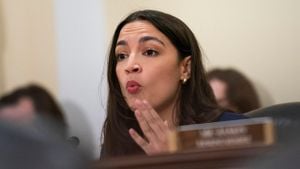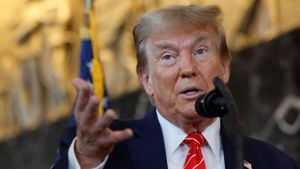Social media has transformed how news is consumed and shared. Today, many people rely on social media influencers to gather information about current events. A recent study by the Pew Knight Initiative sheds light on the political leanings and demographic profiles of these news influencers, examining their rising roles as alternatives to traditional news outlets.
According to the report, which analyzed nearly 28,000 social media accounts, news influencers—those with at least 100,000 followers who discuss current events—are predominantly right-leaning. The study found out of the influencers surveyed, 27% identified as right-leaning, whereas only 21% identified as left-leaning. It's important to note, though, about half of these influencers chose not to clearly define their political stance.
Surprisingly, the gender breakdown among news influencers shows men significantly outnumber women, creating a stark divide reminiscent of old-school news anchoring which was once heavily male-dominated. The Pew findings reveal about 63% of news influencers are male, whereas only 30% are female. This stark inequality stands out even more when juxtaposed with broader influencer demographics. For reference, women dominated influencer deals by generating 77% of those partnerships according to research from the influencer agency Izea. Experts worry this pronounced gender gap may influence the type of news and stories shared across various social media platforms.
Social media news influencers have gained traction particularly among younger individuals. One-in-five Americans now sources news from these influencers, and many say this group has significantly impacted their political views. Galen Stocking, senior computational social scientist at the Pew Research Center, noted, "News influencers have emerged as one of the key alternatives to traditional outlets... especially among younger folks." This suggests social media influencers are increasingly seen as credible sources of information, infiltrated within the dense fabric of the digital information ecosystem.
Among the major platforms analyzed—Facebook, Instagram, TikTok, X (formerly Twitter), and YouTube—Facebook emerged as the most politically skewed platform. Influencers there are three times more likely to share conservative viewpoints (39%) compared to liberal ones (13%). On the contrary, TikTok shows nearly equal representation, where 28% of influencers lean left against 25% who lean right, marking it as the only prominent site where left-wing influencers outnumber their right-wing counterparts.
Interestingly, TikTok doesn’t just stand out politically; it also offers the smallest gender gap among news influencers. The platform boasts about 50% of its influencers identifying as men and around 45% identifying as women. This contrasts sharply with other platforms where the male-to-female ratio skews heavily toward men, often nearly two-to-one. On platforms like X, about 96% of influencers are active, showcasing the diverse ways they engage with audiences.
While these influencers extensively cover political content, it’s noteworthy to mention only 23% have any formal journalism background or connections to traditional media houses. This statistic raises questions about the depth and reliability of the information shared and whether these influencers can truly replace conventional journalism. Among those who do identify as active journalists, the majority also lean significantly right, with 25% marking themselves as conservative or pro-Trump, compared to just 9% who identify as liberal or pro-Democratic.
The growing power of influencers isn't solely about numbers; it's also about connections. They often utilize platforms beyond traditional social media to reach audiences, with 34% using podcasts and unique avenues like newsletters or chats to engage followers. This leaves observers wondering how political campaigns might adapt their digital strategies to engage effectively with these influencers, especially considering how both leading political parties have actively courted online influencers for campaigning. The 2024 presidential election saw candidates tailoring their content strategies based on influencer styles to reach younger demographics.
For example, Donald Trump and JD Vance shifted their strategies toward courting male audiences by appearing on male-dominated platforms like the Joe Rogan Experience, illustrating how certain content forms can skew political engagement. Meanwhile, Kamala Harris opted for influencers more likely to appeal to women, using interviews with popular female podcasters to connect with young women.
This gender consideration within influencer strategies raises complex questions about the efficacy of messaging aimed toward different demographics. For young voters—especially men and women under 30—data shows significant polarization within partisan lines. Men within this age bracket are shifting more conservative, whereas young women are trending leftward.
Through this lens, one can't help but ponder how the influencer strategy will adapt over time, especially as polling suggests shifting political orientations among younger adults. Social media continues to evolve, and the importance of these influencers can't be underestimated; they're shaping the information narrative directly with significant future repercussions likely on political discourse.
Trust levels among traditional media continue to deteriorate. Recent findings show only 59% of US adults feel either "a lot" or "some" trust toward national news sources, down dramatically from 76% reported back in 2016. Contrarily, trust levels for information from social media platforms are maintaining steady growth, creeping up from 34% to 37%. All these shifts indicate a power dynamic pivot occurring right under our noses, and figures indicate social media influencers are gaining ground during this environmental shift.
The influence of this new wave of news sharers poses compelling challenges and opportunities. For one thing, they signify the gradual downfall of traditional media trustworthiness and the rise of alternative forms of digital communication. People are increasingly turning online to fulfill their news needs, with influencers at the forefront of this cultural evolution.
Looking forward, the nuances of how content is curated and the potential for bias or slant introduces new layers of complexity. The wider gender gap among influencers might limit perspectives shared publicly. Therefore, the question stands: how will the balance of voices and perspectives change as society becomes more reliant on these influencers? Will they create more echo chambers of political positioning or encourage more open debate?
This new paradigm calls for public literacy about information consumption norms and recognizing the potential limitations and biases inherent within influencer-derived content. The future of news, driven by these dynamic social media influencers, is already here and beckoning individuals to adapt to this fast-paced and often reactive environment. The quest remains to balance trustworthy information with entertaining delivery as these influencers navigate their growing influence within our society.



